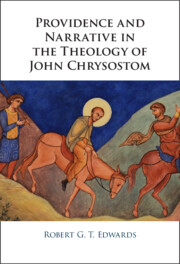Book contents
- Providence and Narrative in the Theology of John Chrysostom
- Providence and Narrative in the Theology of John Chrysostom
- Copyright page
- Dedication
- Epigraph
- Contents
- Preface
- Abbreviations
- 1 Stories of Suffering and Providence
- 2 Divine and Human Activity in Biblical Narrative
- 3 Narrative Clusters, Providential Habits, and Typological Exegesis
- 4 Proofs of Providence and God’s Philanthropic Character
- 5 True Judgements and Consolation
- 6 The Virtue of Yielding to Providence
- 7 Conclusion
- Bibliography
- Scriptural Index
- Subject Index
7 - Conclusion
Published online by Cambridge University Press: 01 December 2022
- Providence and Narrative in the Theology of John Chrysostom
- Providence and Narrative in the Theology of John Chrysostom
- Copyright page
- Dedication
- Epigraph
- Contents
- Preface
- Abbreviations
- 1 Stories of Suffering and Providence
- 2 Divine and Human Activity in Biblical Narrative
- 3 Narrative Clusters, Providential Habits, and Typological Exegesis
- 4 Proofs of Providence and God’s Philanthropic Character
- 5 True Judgements and Consolation
- 6 The Virtue of Yielding to Providence
- 7 Conclusion
- Bibliography
- Scriptural Index
- Subject Index
Summary
After Chapters 5 and 6, it is tempting to think that whereas other early Christians could be labelled ‘dogmatic’ philosophers, Chrysostom is merely a ‘practical’ one; perhaps he is even just a moralist. And it is true that if we were to compare him to, for example, Nemesius of Emesa – whom we have mentioned several times through this study – there is indeed a real contrast, despite their shared theological milieu. For example, Nemesius frames his discussion of providence within a long-standing philosophical debate, listing the opinions of various schools and responding to them with his own Christian philosophy. In contrast, Chrysostom rarely names philosophers and even refrains from engaging their ideas in detail.1 And these differences are not merely rhetorical but impact their doctrines of providence: for example, while Nemesius is consistent in his maintenance that all externals – including wealth – are goods,2 Chrysostom can occasionally refer to wealth as either indifferent or evil, knowing the danger that it can pose to virtue.
- Type
- Chapter
- Information
- Providence and Narrative in the Theology of John Chrysostom , pp. 187 - 192Publisher: Cambridge University PressPrint publication year: 2022

